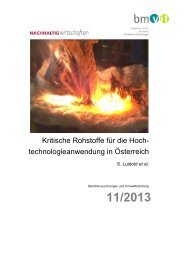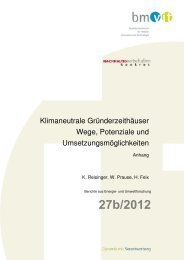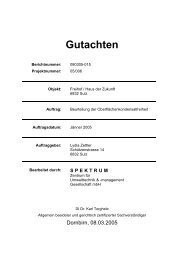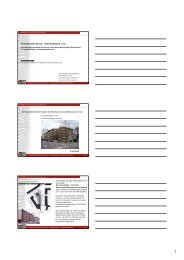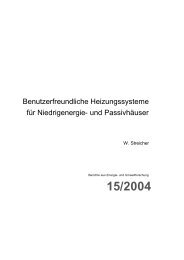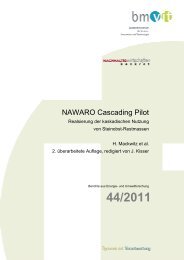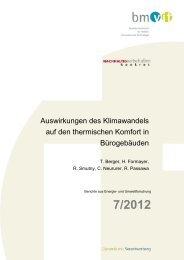- Page 1 and 2:
IEA Solar Heating and Cooling Progr
- Page 3:
IEA Solar Heating and Cooling Progr
- Page 7 and 8:
Endbericht Solare Kühlung und Klim
- Page 9 and 10:
Endbericht Solare Kühlung und Klim
- Page 11 and 12:
Endbericht Solare Kühlung und Klim
- Page 13 and 14:
Endbericht Solare Kühlung und Klim
- Page 15 and 16:
Endbericht Solare Kühlung und Klim
- Page 17 and 18:
Endbericht Solare Kühlung und Klim
- Page 19 and 20:
Endbericht Solare Kühlung und Klim
- Page 21 and 22:
Endbericht Solare Kühlung und Klim
- Page 23 and 24:
Endbericht Solare Kühlung und Klim
- Page 25 and 26:
Endbericht Solare Kühlung und Klim
- Page 27 and 28:
Endbericht Solare Kühlung und Klim
- Page 29 and 30:
Endbericht Solare Kühlung und Klim
- Page 31 and 32:
Endbericht Solare Kühlung und Klim
- Page 33 and 34:
Endbericht Solare Kühlung und Klim
- Page 35 and 36:
Endbericht Solare Kühlung und Klim
- Page 37 and 38:
Task 38 Solar Air-Conditioning and
- Page 39 and 40:
IEA SHC Task 38 Solar Air Condition
- Page 41 and 42:
IEA SHC Task 38 Solar Air Condition
- Page 43 and 44:
IEA SHC Task 38 Solar Air Condition
- Page 45 and 46:
IEA SHC Task 38 Solar Air Condition
- Page 47 and 48:
IEA SHC Task 38 Solar Air Condition
- Page 49 and 50:
IEA SHC Task 38 Solar Air Condition
- Page 51 and 52:
IEA SHC Task 38 Solar Air Condition
- Page 53 and 54:
3.1 Adsorption Systems Table 1: Ads
- Page 55 and 56:
IEA SHC Task 38 Solar Air Condition
- Page 57 and 58:
IEA SHC Task 38 Solar Air Condition
- Page 59 and 60:
IEA SHC Task 38 Solar Air Condition
- Page 61 and 62:
4 Heat Rejection There is a number
- Page 63 and 64:
IEA SHC Task 38 Solar Air Condition
- Page 65 and 66:
IEA SHC Task 38 Solar Air Condition
- Page 67 and 68:
IEA SHC Task 38 Solar Air Condition
- Page 69 and 70:
IEA SHC Task 38 Solar Air Condition
- Page 71 and 72:
IEA SHC Task 38 Solar Air Condition
- Page 73 and 74:
IEA SHC Task 38 Solar Air Condition
- Page 75 and 76:
IEA SHC Task 38 Solar Air Condition
- Page 77 and 78:
IEA SHC Task 38 Solar Air Condition
- Page 79 and 80:
IEA SHC Task 38 Solar Air Condition
- Page 81 and 82:
Task 38 Solar Air-Conditioning and
- Page 83 and 84:
IEA SHC Task 38 Solar Air Condition
- Page 85 and 86:
IEA SHC Task 38 Solar Air Condition
- Page 87 and 88:
IEA SHC Task 38 Solar Air Condition
- Page 89 and 90:
IEA SHC Task 38 Solar Air Condition
- Page 91 and 92:
IEA SHC Task 38 Solar Air Condition
- Page 93 and 94:
IEA SHC Task 38 Solar Air Condition
- Page 95 and 96:
IEA SHC Task 38 Solar Air Condition
- Page 97 and 98:
IEA SHC Task 38 Solar Air Condition
- Page 99 and 100:
IEA SHC Task 38 Solar Air Condition
- Page 101 and 102:
M M IEA SHC Task 38 Solar Air Condi
- Page 103 and 104:
M M M IEA SHC Task 38 Solar Air Con
- Page 105 and 106:
IEA SHC Task 38 Monitoring Procedur
- Page 107 and 108:
Table of tables Table 1 List of ele
- Page 109 and 110:
IEA SHC Task 38 Monitoring Procedur
- Page 111 and 112:
IEA SHC Task 38 Monitoring Procedur
- Page 113 and 114:
IEA SHC Task 38 Monitoring Procedur
- Page 115 and 116:
IEA SHC Task 38 Monitoring Procedur
- Page 117 and 118:
IEA SHC Task 38 Monitoring Procedur
- Page 119 and 120:
IEA SHC Task 38 Monitoring Procedur
- Page 121 and 122:
IEA SHC Task 38 Monitoring Procedur
- Page 123 and 124:
IEA SHC Task 38 Monitoring Procedur
- Page 125 and 126:
IEA SHC Task 38 Monitoring Procedur
- Page 127 and 128:
IEA SHC Task 38 Monitoring Procedur
- Page 129 and 130:
IEA SHC Task 38 Monitoring Procedur
- Page 131 and 132:
IEA SHC Task 38 Monitoring Procedur
- Page 133 and 134:
IEA SHC Task 38 Monitoring Procedur
- Page 135 and 136:
IEA SHC Task 38 Monitoring Procedur
- Page 137 and 138:
IEA SHC Task 38 Monitoring Procedur
- Page 139 and 140:
IEA SHC Task 38 Monitoring Procedur
- Page 141 and 142: IEA SHC Task 38 Monitoring Procedur
- Page 143 and 144: Task 38 Solar Air-Conditioning and
- Page 145 and 146: IEA SHC Task 38 Solar Air Condition
- Page 147 and 148: IEA SHC Task 38 Solar Air Condition
- Page 149 and 150: IEA SHC Task 38 Solar Air Condition
- Page 151 and 152: IEA SHC Task 38 Solar Air Condition
- Page 153 and 154: IEA SHC Task 38 Solar Air Condition
- Page 155 and 156: IEA SHC Task 38 Solar Air Condition
- Page 157 and 158: IEA SHC Task 38 Solar Air Condition
- Page 159 and 160: IEA SHC Task 38 Solar Air Condition
- Page 161 and 162: IEA SHC Task 38 Solar Air Condition
- Page 163 and 164: IEA SHC Task 38 Solar Air Condition
- Page 165 and 166: IEA SHC Task 38 Solar Air Condition
- Page 167 and 168: IEA SHC Task 38 Solar Air Condition
- Page 169 and 170: IEA SHC Task 38 Solar Air Condition
- Page 171 and 172: IEA SHC Task 38 Solar Air Condition
- Page 173 and 174: IEA SHC Task 38 Solar Air Condition
- Page 175 and 176: IEA SHC Task 38 Solar Air Condition
- Page 177 and 178: IEA SHC Task 38 Solar Air Condition
- Page 179 and 180: IEA SHC Task 38 Solar Air Condition
- Page 181 and 182: IEA SHC Task 38 Solar Air Condition
- Page 183 and 184: IEA SHC Task 38 Solar Air Condition
- Page 185 and 186: IEA SHC Task 38 Solar Air Condition
- Page 187 and 188: IEA SHC Task 38 Solar Air Condition
- Page 189 and 190: IEA SHC Task 38 Solar Air Condition
- Page 191: IEA SHC Task 38 Solar Air Condition
- Page 195 and 196: IEA SHC Task 38 Solar Air Condition
- Page 197 and 198: IEA SHC Task 38 Solar Air Condition
- Page 199 and 200: IEA SHC Task 38 Solar Air Condition
- Page 201 and 202: IEA SHC Task 38 Solar Air Condition
- Page 203 and 204: Task 38 Solar Air-Conditioning and
- Page 205 and 206: IEA SHC Task 38 Solar Air Condition
- Page 207 and 208: IEA SHC Task 38 Solar Air Condition
- Page 209 and 210: IEA SHC Task 38 Solar Air Condition
- Page 211 and 212: IEA SHC Task 38 Solar Air Condition
- Page 213 and 214: IEA SHC Task 38 Solar Air Condition
- Page 215 and 216: IEA SHC Task 38 Solar Air Condition
- Page 217 and 218: IEA SHC Task 38 Solar Air Condition
- Page 219 and 220: IEA SHC Task 38 Solar Air Condition
- Page 221 and 222: IEA SHC Task 38 Solar Air Condition
- Page 223 and 224: IEA SHC Task 38 Solar Air Condition
- Page 225 and 226: IEA SHC Task 38 Solar Air Condition
- Page 227 and 228: IEA SHC Task 38 Solar Air Condition
- Page 229 and 230: IEA SHC Task 38 Solar Air Condition
- Page 231 and 232: IEA SHC Task 38 Solar Air Condition
- Page 233 and 234: IEA SHC Task 38 Solar Air Condition
- Page 235 and 236: IEA SHC Task 38 Solar Air Condition
- Page 237 and 238: IEA SHC Task 38 Solar Air Condition
- Page 239: IEA SHC Task 38 Solar Air Condition
- Page 242 and 243:
IEA SHC Task 38 Solar Air Condition
- Page 244 and 245:
IEA SHC Task 38 Solar Air Condition
- Page 246 and 247:
IEA SHC Task 38 Solar Air Condition
- Page 248 and 249:
IEA SHC Task 38 Solar Air Condition
- Page 250 and 251:
IEA SHC Task 38 Solar Air Condition
- Page 252 and 253:
IEA SHC Task 38 Solar Air Condition
- Page 254 and 255:
IEA SHC Task 38 Solar Air Condition
- Page 256 and 257:
IEA SHC Task 38 Solar Air Condition
- Page 258 and 259:
IEA SHC Task 38 Solar Air Condition
- Page 260 and 261:
Task 38 Solar Air-Conditioning and
- Page 262 and 263:
- - - - - - - - - - -
- Page 264 and 265:
- - - - - - - - - - -
- Page 266 and 267:
Pompe évaporateur + compteur C3 Dr
- Page 268 and 269:
80 70 Temperature (°C) 60 50 40 3
- Page 270 and 271:
Power (kW) 20 19 18 17 16 15 14 13
- Page 272 and 273:
Power (kW) 20 19 18 17 16 15 14 13
- Page 274 and 275:
Task 38 Solar Air-Conditioning and
- Page 276 and 277:
IEA SHC Task 38 Solar Air Condition
- Page 278 and 279:
IEA SHC Task 38 Solar Air Condition
- Page 280 and 281:
IEA SHC Task 38 Solar Air Condition
- Page 282 and 283:
IEA SHC Task 38 Solar Air Condition
- Page 284 and 285:
IEA SHC Task 38 Solar Air Condition
- Page 286 and 287:
IEA SHC Task 38 Solar Air Condition
- Page 288 and 289:
IEA SHC Task 38 Solar Air Condition
- Page 290 and 291:
IEA SHC Task 38 Solar Air Condition
- Page 292 and 293:
IEA SHC Task 38 Solar Air Condition
- Page 294 and 295:
IEA SHC Task 38 Solar Air Condition
- Page 296 and 297:
IEA SHC Task 38 Solar Air Condition
- Page 298 and 299:
IEA SHC Task 38 Solar Air Condition
- Page 300 and 301:
Task 38 Solar Air-Conditioning and
- Page 302 and 303:
IEA SHC Task 38 Solar Air Condition
- Page 304 and 305:
IEA SHC Task 38 Solar Air Condition
- Page 306 and 307:
IEA SHC Task 38 Solar Air Condition
- Page 308 and 309:
IEA SHC Task 38 Solar Air Condition
- Page 310 and 311:
IEA SHC Task 38 Solar Air Condition
- Page 312 and 313:
IEA SHC Task 38 Solar Air Condition
- Page 314 and 315:
IEA SHC Task 38 Solar Air Condition
- Page 316 and 317:
IEA SHC Task 38 Solar Air Condition
- Page 318 and 319:
IEA SHC Task 38 Solar Air Condition
- Page 320 and 321:
IEA SHC Task 38 Solar Air Condition
- Page 322 and 323:
IEA SHC Task 38 Solar Air Condition
- Page 324 and 325:
IEA SHC Task 38 Solar Air Condition
- Page 326 and 327:
IEA SHC Task 38 Solar Air Condition
- Page 328 and 329:
Task 38 Solar Air-Conditioning and
- Page 330 and 331:
IEA SHC Task 38 Solar Air Condition
- Page 332 and 333:
IEA SHC Task 38 Solar Air Condition
- Page 334 and 335:
IEA SHC Task 38 Solar Air Condition
- Page 336 and 337:
IEA SHC Task 38 Solar Air Condition
- Page 338 and 339:
IEA SHC Task 38 Solar Air Condition
- Page 340 and 341:
IEA SHC Task 38 Solar Air Condition
- Page 342 and 343:
IEA SHC Task 38 Solar Air Condition
- Page 344 and 345:
IEA SHC Task 38 Solar Air Condition
- Page 346 and 347:
IEA SHC Task 38 Solar Air Condition
- Page 348 and 349:
IEA SHC Task 38 Solar Air Condition
- Page 350 and 351:
IEA SHC Task 38 Solar Air Condition
- Page 352 and 353:
Country Name/ Company City Applicat
- Page 354 and 355:
79 Spain Private House Olivares-Sev
- Page 356 and 357:
Task 38 Solar Air-Conditioning and
- Page 358 and 359:
Questionnaire for Owners of Small-S
- Page 360 and 361:
Questionnaire for Owners of Small-S
- Page 362 and 363:
Questionnaire for Owners of Small-S
- Page 364 and 365:
Fragebogen an Besitzer solare Kühl
- Page 366 and 367:
Fragebogen an Besitzer solare Kühl
- Page 368 and 369:
Fragebogen an Besitzer solare Kühl
- Page 370 and 371:
Cuestionario para propietarios de i
- Page 372 and 373:
Cuestionario para propietarios de i
- Page 374 and 375:
Cuestionario para propietarios de i
- Page 376 and 377:
Cuestionario para propietarios de i
- Page 378 and 379:
Questions to Package Solution Provi
- Page 380 and 381:
9. Maintenance o What type of maint
- Page 382 and 383:
IEA SHC Task 38 Solar Air Condition
- Page 384 and 385:
IEA SHC Task 38 Solar Air Condition
- Page 386 and 387:
IEA SHC Task 38 Solar Air Condition
- Page 388 and 389:
IEA SHC Task 38 Solar Air Condition
- Page 390 and 391:
IEA SHC Task 38 Solar Air Condition
- Page 392 and 393:
IEA SHC Task 38 Solar Air Condition
- Page 394 and 395:
IEA SHC Task 38 Solar Air Condition
- Page 396 and 397:
IEA SHC Task 38 Solar Air Condition
- Page 398 and 399:
IEA SHC Task 38 Solar Air Condition
- Page 400 and 401:
IEA SHC Task 38 Solar Air Condition
- Page 402 and 403:
IEA SHC Task 38 Solar Air Condition
- Page 404 and 405:
IEA SHC Task 38 Solar Air Condition
- Page 406 and 407:
IEA SHC Task 38 Solar Air Condition
- Page 408 and 409:
IEA SHC Task 38 Solar Air Condition
- Page 410 and 411:
IEA SHC Task 38 Solar Air Condition
- Page 412 and 413:
IEA SHC Task 38 Solar Air Condition
- Page 414 and 415:
IEA SHC Task 38 Solar Air Condition
- Page 416 and 417:
IEA SHC Task 38 Solar Air Condition
- Page 418 and 419:
IEA SHC Task 38 Solar Air Condition
- Page 420 and 421:
IEA SHC Task 38 Solar Air Condition
- Page 422 and 423:
IEA SHC Task 38 Solar Air Condition
- Page 424 and 425:
IEA SHC Task 38 Solar Air Condition
- Page 426 and 427:
IEA SHC Task 38 Solar Air Condition
- Page 428 and 429:
IEA SHC Task 38 Solar Air Condition
- Page 430 and 431:
IEA SHC Task 38 Solar Air Condition
- Page 432 and 433:
IEA SHC Task 38 Solar Air Condition
- Page 434 and 435:
IEA SHC Task 38 Solar Air Condition
- Page 436 and 437:
IEA SHC Task 38 Solar Air Condition
- Page 438 and 439:
IEA SHC Task 38 Solar Air Condition
- Page 440 and 441:
IEA SHC Task 38 Solar Air Condition
- Page 442 and 443:
IEA SHC Task 38 Solar Air Condition
- Page 444 and 445:
IEA SHC Task 38 Solar Air Condition
- Page 446 and 447:
IEA SHC Task 38 Solar Air Condition
- Page 448 and 449:
IEA SHC Task 38 Solar Air Condition
- Page 450 and 451:
IEA SHC Task 38 Solar Air Condition
- Page 452 and 453:
IEA SHC Task 38 Solar Air Condition
- Page 454 and 455:
IEA SHC Task 38 Solar Air Condition
- Page 456 and 457:
IEA SHC Task 38 Solar Air Condition
- Page 458 and 459:
IEA SHC Task 38 Solar Air Condition
- Page 460 and 461:
IEA SHC Task 38 Solar Air Condition
- Page 462 and 463:
IEA SHC Task 38 Solar Air Condition
- Page 464 and 465:
IEA SHC Task 38 Solar Air Condition
- Page 466 and 467:
IEA SHC Task 38 Solar Air Condition
- Page 468 and 469:
IEA SHC Task 38 Solar Air Condition
- Page 470 and 471:
IEA SHC Task 38 Solar Air Condition
- Page 472 and 473:
IEA SHC Task 38 Solar Air Condition
- Page 474 and 475:
IEA SHC Task 38 Solar Air Condition
- Page 476 and 477:
IEA SHC Task 38 Solar Air Condition
- Page 478 and 479:
IEA SHC Task 38 Solar Air Condition
- Page 480 and 481:
IEA SHC Task 38 Solar Air Condition
- Page 482 and 483:
IEA SHC Task 38 Solar Air Condition
- Page 484 and 485:
IEA SHC Task 38 Solar Air Condition
- Page 486 and 487:
IEA SHC Task 38 Solar Air Condition
- Page 488 and 489:
IEA SHC Task 38 Solar Air Condition
- Page 490 and 491:
IEA SHC Task 38 Solar Air Condition
- Page 492 and 493:
IEA SHC Task 38 Solar Air Condition
- Page 494 and 495:
IEA SHC Task 38 Solar Air Condition
- Page 496 and 497:
IEA SHC Task 38 Solar Air Condition
- Page 498 and 499:
IEA SHC Task 38 Solar Air Condition
- Page 500 and 501:
IEA SHC Task 38 Solar Air Condition
- Page 502 and 503:
IEA SHC Task 38 Solar Air Condition
- Page 504 and 505:
IEA SHC Task 38 Solar Air Condition
- Page 506 and 507:
IEA SHC Task 38 Solar Air Condition
- Page 508 and 509:
IEA SHC Task 38 Solar Air Condition
- Page 510 and 511:
IEA SHC Task 38 Solar Air Condition
- Page 512 and 513:
IEA SHC Task 38 Solar Air Condition
- Page 514 and 515:
IEA SHC Task 38 Solar Air Condition
- Page 516 and 517:
IEA SHC Task 38 Solar Air Condition
- Page 518 and 519:
IEA SHC Task 38 Solar Air Condition
- Page 520 and 521:
IEA SHC Task 38 Solar Air Condition
- Page 522 and 523:
IEA SHC Task 38 Solar Air Condition
- Page 524 and 525:
IEA SHC Task 38 Solar Air Condition
- Page 526 and 527:
IEA SHC Task 38 Solar Air Condition
- Page 528 and 529:
IEA SHC Task 38 Solar Air Condition
- Page 530 and 531:
IEA SHC Task 38 Solar Air Condition
- Page 532 and 533:
IEA SHC Task 38 Solar Air Condition
- Page 534 and 535:
IEA SHC Task 38 Solar Air Condition
- Page 536 and 537:
IEA SHC Task 38 Solar Air Condition
- Page 538 and 539:
IEA SHC Task 38 Solar Air Condition
- Page 540 and 541:
IEA SHC Task 38 Solar Air Condition
- Page 542 and 543:
IEA SHC Task 38 Solar Air Condition
- Page 544 and 545:
IEA SHC Task 38 Solar Air Condition
- Page 546 and 547:
IEA SHC Task 38 Solar Air Condition
- Page 548 and 549:
IEA SHC Task 38 Solar Air Condition
- Page 550 and 551:
IEA SHC Task 38 Solar Air Condition
- Page 552 and 553:
IEA SHC Task 38 Solar Air Condition
- Page 554 and 555:
IEA SHC Task 38 Solar Air Condition
- Page 556 and 557:
IEA SHC Task 38 Solar Air Condition
- Page 558 and 559:
IEA SHC Task 38 Solar Air Condition
- Page 560 and 561:
IEA SHC Task 38 Solar Air Condition
- Page 562 and 563:
IEA SHC Task 38 Solar Air Condition
- Page 564 and 565:
IEA SHC Task 38 Solar Air Condition
- Page 566 and 567:
IEA SHC Task 38 Solar Air Condition
- Page 568 and 569:
IEA SHC Task 38 Solar Air Condition
- Page 570 and 571:
IEA SHC Task 38 Solar Air Condition
- Page 572 and 573:
Task 38 Solar Air-Conditioning and
- Page 574 and 575:
IEA SHC Task 38 Solar Air Condition
- Page 576 and 577:
IEA SHC Task 38 Solar Air Condition
- Page 578 and 579:
IEA SHC Task 38 Solar Air Condition
- Page 580 and 581:
IEA SHC Task 38 Solar Air Condition
- Page 582 and 583:
IEA SHC Task 38 Solar Air Condition
- Page 584 and 585:
IEA SHC Task 38 Solar Air Condition
- Page 586 and 587:
IEA SHC Task 38 Solar Air Condition
- Page 588 and 589:
IEA SHC Task 38 Solar Air Condition
- Page 590 and 591:
IEA SHC Task 38 Solar Air Condition
- Page 592 and 593:
IEA SHC Task 38 Solar Air Condition
- Page 594 and 595:
IEA SHC Task 38 Solar Air Condition
- Page 596 and 597:
IEA SHC Task 38 Solar Air Condition
- Page 598 and 599:
IEA SHC Task 38 Solar Air Condition
- Page 600 and 601:
IEA SHC Task 38 Solar Air Condition
- Page 602 and 603:
IEA SHC Task 38 Solar Air Condition
- Page 604 and 605:
IEA SHC Task 38 Solar Air Condition
- Page 606 and 607:
IEA SHC Task 38 Solar Air Condition
- Page 608 and 609:
IEA SHC Task 38 Solar Air Condition
- Page 610 and 611:
IEA SHC Task 38 Solar Air Condition
- Page 612 and 613:
IEA SHC Task 38 Solar Air Condition
- Page 614 and 615:
Grundprinzip Solare Wärme thermisc
- Page 616 and 617:
Hintergrund Operating Agent: Hans-M
- Page 618 and 619:
- Leistungsvergleich von verfügbar
- Page 620 and 621:
Subtask A: Pre-engineered systems f
- Page 622 and 623:
Abb. 3: Das Bürogebäude in St. Sc
- Page 624 and 625:
Beispiele realisierter großer Syst
- Page 626 and 627:
a) b) c) Abb. 9: Installation eines
- Page 628 and 629:
Subtask C: Modelling and fundamenta
- Page 630 and 631:
Liste der Systeme im Monitoring von
- Page 632 and 633:
Liste der Systeme im Monitoring von
- Page 634 and 635:
Marletta, L., Evola, G. and Sicurel
- Page 636 and 637:
Ellehauge & Kildemoes Vestergade 48
- Page 638:
Tekniker Centro Tecnológico Teknik



